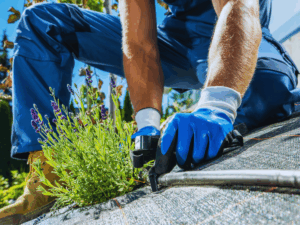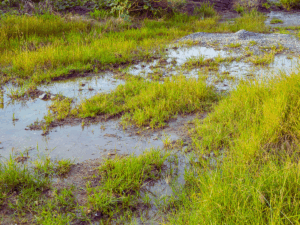 A Dallas homeowner steps outside to find soggy patches across the lawn. The sprinkler system hasn’t been running, but the ground feels soft and damp. It’s a common problem in North Texas—sprinkler leaks caused by the city’s unpredictable weather.
A Dallas homeowner steps outside to find soggy patches across the lawn. The sprinkler system hasn’t been running, but the ground feels soft and damp. It’s a common problem in North Texas—sprinkler leaks caused by the city’s unpredictable weather.
Dallas heat, heavy rain, clay soil, and occasional freezes all put stress on irrigation systems. Eventually, something will break.
This guide explains how local weather affects your sprinkler lines, what warning signs to look for, and how to prevent future leaks.
Dallas Weather and Soil Conditions
Dallas sits in a region defined by dramatic temperature swings and reactive soil. Hot summers, heavy spring rains, and short, severe winter freezes make it hard for underground pipes and fittings.
The ground adds to the problem. The area’s clay-rich soil expands when wet and shrinks when dry. This causes sprinkler lines to move, bend, and eventually break.
Hot Summers and Sudden Cold Snaps
Extreme heat makes sprinkler pipes expand. When cooler nights follow, those same materials contract. This constant thermal cycling weakens joints and fittings, eventually creating gaps where water escapes.
Heavy Rain and Flooding
Seasonal storms often dump inches of rain in a single night. That sudden influx of water saturates soil and shifts buried lines, especially near sprinkler heads and connections.
Excess water also increases pressure inside pipes, which can expose weak spots or small cracks.
Expansive Clay Soil in North Texas
Clay soil is notorious for swelling when wet and shrinking during dry spells. This movement exerts physical pressure on irrigation lines and fittings, often leading to slow, hidden leaks.
Over time, these underground shifts can misalign sprinkler heads or rupture buried joints.
Common Weather-Related Causes of Sprinkler Leaks
Dallas weather doesn’t just wear out sprinkler systems—it actively works against them. Each season brings new stresses that can cause or worsen leaks.
1) Thermal Expansion and Contraction
Heat expands PVC and polyethylene pipes. Cool evenings cause them to contract.
That movement loosens seals and weakens connections, creating a slow leak that wastes water and raises utility bills.
2) Soil Movement and Ground Shifting
As soil expands and contracts, sprinkler lines twist and bend. Even small shifts can fracture pipes or dislodge fittings, especially in older systems that lack flexibility.
3) Excess Moisture and Flooding
During storms, saturated soil exerts pressure on underground pipes. Standing water can also shift sprinkler heads out of alignment, causing uneven watering or pooling across the yard.
4) Heat Degradation of Materials
High temperatures and sun exposure damage plastic sprinkler heads and rubber seals. Over time, they become brittle, leading to cracks, leaks, and poor water distribution.
5) Freeze and Thaw Damage
Dallas may not see long winters, but brief freezes still cause trouble. When trapped water freezes inside pipes, it expands and cracks fittings.
Once the ice melts, the source of the leak often goes unnoticed until water bills rise.
6) Pressure Fluctuations
During summer, high irrigation demand and municipal surges increase water pressure. That pressure can push past weak joints or cause broken sprinkler heads.
7) Root Intrusion During Wet Seasons
Plants and trees grow aggressively after heavy rainfall. Roots seek out moisture, sometimes entering small pipe cracks or fittings and turning a minor leak into a major blockage.
Signs You Have a Sprinkler Leak
 Leaks often start small, but they leave clues behind. Recognizing them early prevents wasted water and damage to your yard.
Leaks often start small, but they leave clues behind. Recognizing them early prevents wasted water and damage to your yard.
Visible Symptoms
Look for soggy or sunken spots even when the system isn’t running. Water pooling or bubbling near sprinkler heads suggests a leak beneath the surface.
Misaligned or stuck heads are also common when pressure drops inside the line.
Hidden Signs
Unexplained spikes in water bills are the most common indicator of a hidden leak. You may also notice uneven watering, dry patches, or areas that stay damp for days.
In some cases, you’ll hear hissing or dripping from underground pipes.
How to Confirm a Leak
Start with a simple water meter test: turn off all indoor and outdoor water, then check if the meter still moves. Use a pressure gauge to check for inconsistencies in your sprinkler system.
If you think there is a bigger problem, contact a local irrigation technician. They can find the leak using special methods.
How Dallas Weather Makes Leaks Worse Over Time
Dallas’s mix of heat, clay soil, and seasonal rain creates an ongoing cycle of stress. Each expansion, contraction, and soil shift turns small cracks into larger leaks.
UV rays also break down exposed sprinkler parts faster than in cooler climates. These combined effects mean minor leaks can quickly grow into major water losses if ignored.
How to Prevent Sprinkler Leaks in Dallas
Regular maintenance and smart upgrades protect your system from Dallas’s unpredictable weather.
Seasonal Inspections and Maintenance
Inspect your irrigation system twice a year—once in spring and again in fall. Flush lines before winter to remove trapped water that could freeze and expand.
Use Quality Materials
Choose thicker-walled PVC or flexible piping that can handle soil movement and temperature swings. High-quality materials last longer and reduce repair frequency.
Upgrade with Smart Technology
Modern systems use pressure regulators, moisture sensors, and smart controllers that adjust watering automatically. These tools prevent overwatering and protect your irrigation system from unnecessary wear.
Landscaping Choices
Avoid deep-rooted plants near sprinkler lines. Maintain even soil moisture with mulch or ground cover to reduce swelling and shrinkage in clay soil.
Hire Professionals for Repairs
If you suspect a leak, don’t dig blindly. Expert technicians can find hidden leaks, repair broken sprinkler heads, and test your system to prevent future failures.
The Cost of Ignoring Sprinkler Leaks
Even small leaks can waste hundreds of gallons each week. Over time, that excess water drives up utility bills and damages landscaping.
Persistent moisture weakens soil, leading to erosion or foundation stress. Ignoring a leak may save time today, but it guarantees higher repair costs later.
Call Lawn Sense — Dallas’s Sprinkler Repair Experts
 Dallas weather puts sprinkler systems under unique stress. Regular inspections and proactive maintenance prevent costly leaks and protect your yard year-round.
Dallas weather puts sprinkler systems under unique stress. Regular inspections and proactive maintenance prevent costly leaks and protect your yard year-round.
Lawn Sense means no nonsense. We serve Dallas, TX, and nearby areas, offering reliable irrigation system repair and maintenance. Stop wasting water and money—contact us today to schedule your sprinkler inspection.